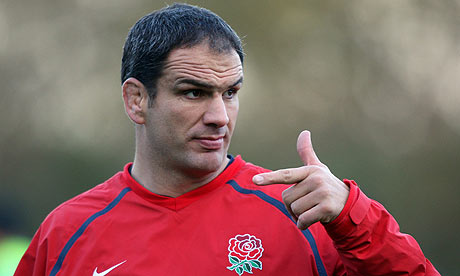
Once again Australia and England showed they are two nations deeply divided by a shared passion for getting stuck in to each other on the rugby field. Their collisions - this one scrappy but still fierce - are becoming an autumnal ritual of fists and mellow brutalness, but, given the result, we should on this occasion salute resilience in the face of shuddering intimidation.
Al Baxter, 31, Australia's long-serving tighthead prop, had a terrible time of it against Andrew Sheridan three years ago when Australia were last at Twickenham, ending up in the sin-bin after transgression proved a preferable option to soaking up further punishment. As a second-half substitute, he suffered further persecution from his bull-like adversary in the World Cup quarter-final in Marseille 13 months ago.
It was an act of bravery by Baxter to come back for yet more today. Rarely can the sweet taste of revenge have been more painfully earned as Australia, the far more disciplined and savvy side, fed off England's recklessness and wretched mistakes to establish control and then seal victory with the pick of the match's two tries.
None of this would have been possible had the Australia pack surrendered quite as abjectly as they did at Twickenham in 2005 or on that heady afternoon in the south of France in October last year. It would be overstating things to say that on this occasion Baxter mastered Sheridan - nor, in the literal sense, did he stand up to him because he spent a great deal of time with his face in the turf - but he did manage to disrupt England's scrummaging effort.
Baxter said before the game he thought that his own and Australia's scrummaging had improved and added: "This match against England will be an indication of where we're at." He was right about the improvement, but it was more by negating the home forwards than dominating them that Australia did so much better on this occasion and they will know as well as anyone that their front five are far from being an outstanding combination. They deserved their celebration at the final whistle, though.
Without the smooth possession they were counting on, the England backs were exposed as not quite the force they had appeared to be a week ago against the Pacific Islanders. The half-backs, Danny Care and Danny Cipriani, were particularly disappointing, although it would be far too early to doubt that with more experience of the international game they can be important players in the future.
Martin Johnson refused to be rattled by his first defeat as England manager. "We have to trust ourselves and play," he said. "The opportunities were there today. We had a lot of possession. It was one-try all and we made more breaks."
Even if Johnson did want to dismiss this defeat as being of little consequence in the greater scheme of the game's big competitions, he knows this is not the case because it may seriously affect England's wellbeing at the 2011 World Cup in New Zealand.
The whiff of cordite from the last World Cup may still be fresh in the nostrils, but the seedings for the next one will be decided in less than a month, which may seem absurdly overeager by the organisers but as Johnson says, profoundly: "There's nothing I can do about it."
Given this situation, the important thing as far as England are concerned is that they hold on to fourth place in the IRB world rankings so as to avoid the strong possibility of going into a pool with New Zealand, Australia or world champions South Africa, who are assured of top-four seedings.
Before today Argentina were still in close enough attendance to overtake England before December 1, which is the cut-off date.
It is the first time that the seedings will be based on the these rankings. "They are now very well established," Syd Millar, the Rugby World Cup chairman, says, "and provide us with a credible and succinct way of seeding teams for the Rugby World Cup pool draw."
Yes, but even in these days when long lead-in times equal more opportunities for commercial exploitation, making the draw with nearly three years to go is still ridiculously early.

